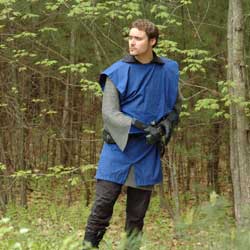Experience
Characters gain experience as they move from event to event. As your character survives an event, the character earns experience points that you can then spend to buy new skills or improve existing ones.

Experience Points
Characters earn experience points (XP) when they attend events. The longer and more dangerous the event, the more experience it’s worth.
- "One-day" events are primarily indoor events. They feature some combat but are primarily fueled by role-playing and problem-solving. They usually run about five hours. They are worth 1 XP.
- "Two-day" events feature twelve to sixteen hours of play; often some of this is outdoor adventure. Some combine an introductory section on one night with a day-long outdoor adventure the next day. They are usually worth 2 XP total.
- "Weekend" events run from Friday night until early Sunday afternoon. These are at an outdoor campground. They are worth 3 XP.
Game Masters and staff also receive full XP for the events they run or staff.
Spending Experience Points
Characters with a "lower version" of an ability who wish to purchase a "higher version" can automatically convert the points invested in the lower ability into points spent on the higher ability when purchasing the higher ability. For example, someone with 2 points spent on Lore would only need to spend 1.5 points to buy Sage, and someone with Social Distinction would only need to spend 1 point to buy Prominence (though they would still have to go through the normal Status procedure again). Characters can also "buy down" an ability from a higher to a lower version, in the same manner as moving skills.
Buying off Disadvantages
Buying off a disadvantage requires paying the cost of the disadvantage, in normal ("growth") XP. This ensures that you have enough character points to pay for all your skills. Once you have bought off a disadvantage, you may not take that disadvantage again.
Experience Limits
In order to keep character balance fair, experience changes as your character grows more powerful. Once characters reach 25 points, they may only spend 4 points per calendar year on adding or improving skills. When a character reaches 35 points, this limit becomes 1 point per calendar year. So a character who begins the year with 33 points may only advance to 36 over the course of a year.
By being on a game staff or playing near the end of the year, you may be able to earn points in a given year without getting a chance to spend them. You can apply points to a previous year’s quota so long as those points were earned in or before the year they are applied to.
Your character will continue to earn full experience at all games; only your ability to spend it is limited. This may mean you earn more experience than you can spend. You may choose to store this leftover, "non-growth" XP and spend it during following years, or it may be used in the following ways:
- Converting XP into Money: You can always convert XP into money, even if you’ve spent your full total of points for the year.
- Moving Skills: Characters may move points from one skill into another, at the cost of one non-growth XP for each XP moved. For instance, you could get rid of a 2-point skill and move those 2 points into another skill. This move would cost you 2 points of non-growth XP as a "tax." (Moving points from a skill into buying off a disadvantage will incur no tax — only moving points from one skill to another skill does this.)
Rules Changes
Characters in the Continuing Game world are kept from game to game, but Quest’s rules may change after a character's date of creation. If Quest changes a rule or skill that applies to your character, you may alter your character to compensate. For instance, if a disadvantage is changed and no longer fits your character concept, you may change it to another disadvantage. Similarly, if you have a skill that is changed and no longer works for your character, you may "reclaim" the points from that skill to use elsewhere. If a skill (even a free one) becomes more expensive, you can either shift points into the skill from some other skill or discard the skill and use its points elsewhere. However, unless you have special authorization from Quest, you may not reclaim points from unchanged skills to purchase changed skills.
Mystic paths must be rebuilt using the new paths and the standard rules.
If you have a potion of a spell that has changed level, been reworded, or been replaced by another spell, then your potion changes along with the spell. If this makes your potion more valuable, you do not have to pay more; similarly, if this makes your potion less valuable, you do not get a refund. This principle also applies to other magic items.
If you have a potion of a spell that has been removed, either entirely or just from the alchemy list, you may not keep the potion. As compensation, you get your choice of either the removed potion's purchase price in marks, or a number of potions whose spell levels are equal to that of the removed potion (your choice of new potions). This principle may not always apply to other magic items; for those, you should consult a Rules Marshal.
Points spent as a result of rules changes do not count towards your yearly expenditure total. For instance, if one of your skills got 1 point cheaper, you may spend that 1 point however you like and it will not affect your yearly spending maximum.
